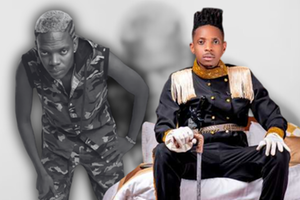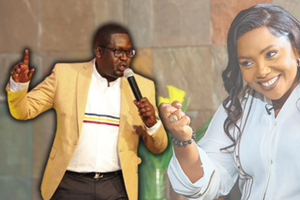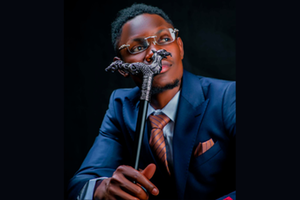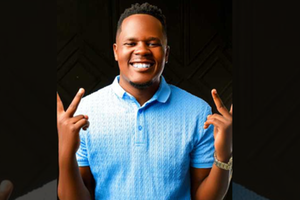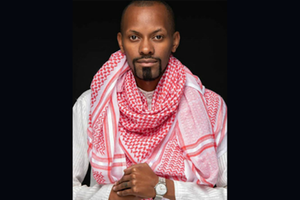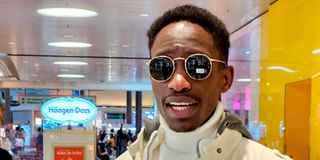
Comedian George Maina, popularly known as Njoro, relocated to the US in 2021 after years of performing on the Churchill Show.
Former Churchill Show comedian George Maina, popularly known as Njoro, opens up about his journey in the comedy industry, his battles with mental health, financial mistakes and his decision to relocate to the US.
In this heartfelt interview, Njoro reflects on his rise to fame, the challenges he faced, and the impact on his family, and shares valuable advice for aspiring entertainers.
1. Tell us a little about yourself and what you studied
Most people know me as Comedian Njoro but my real name is George Maina. I am a journalist by profession. But somehow, I found myself in comedy instead.
I am also a father of four and being a dad is one of my greatest joys.
After college, I interned at Radio Africa Group (2007 to 2008). It was a learning experience. I was also dabbling in acting and scriptwriting. Eventually, I got into comedy. Although journalism was my first love, comedy became my calling.
I wanted to pursue investigative journalism because I was good at digging into stories. But life took a different turn. I don’t regret shifting to comedy because it gave me a platform to entertain and connect with people in a way I hadn’t imagined.
2. Before Churchill's show, what hustles did you do?
I have done it all! After high school, I lived with my grandmother in Waithaka. I worked on farms and did odd jobs like Mjengo to make ends meet. Those experiences shaped me.
Around that time, I started attending comedy auditions. One thing led to another, and I found myself performing at the Churchill Show.
My comedy journey began with open mic nights at Churchill Live (before it became the Churchill Show).
Back then, it wasn’t owned by Churchill himself but by Cinematics Media under filmmaker Bob Nyanja. I started small, performing for small audiences. Slowly but surely, I made it to the main stage.
I was at the show for about 10 years. During that time, I grew as a comedian and made a name for myself. The first pay was around Sh500, but it gradually improved to hundreds of thousands.
My big break came when I got endorsements and brand deals with big brands.
3. At what age did you make your first million and how did you invest?
I honestly can’t specify the exact moment because the money came in from different gigs, endorsements, performances, and advertisements. It just happened. I was in my early 20s.
There was even a time I was earning close to a million a month, thanks to brand deals and appearances. Those were the good days. I was a rich young man and very naive. Unfortunately, I didn’t make any major investments. I was young and reckless. Some of the money went to support my family but most of it was living the high life.
Looking back, I wish I had been smarter with my finances. But life is a learning process.
4. You have mentioned struggling with drinking. When did it all begin?
Drinking became part of my life when I started performing at clubs. Before that, I had never tasted alcohol. But as my brand grew and I began landing gigs in places like bars and clubs, I started indulging.
It was hard to avoid the drinking culture. Being surrounded by people who were drinking made it easy to fall into the habit.
At first, I did not even know much about alcohol brands. I remember drinking with politicians and influential people and, the next day, asking my friends what we had been drinking.
I would then go and buy the same thing to keep at home. In about a year, I had become an alcoholic, to the point where I would come home in the morning after drinking all night.
Things spiralled out of control. My financial situation worsened, and my wife left me when I was at my lowest. It was a breaking point for me.
5. What do you regret most about your 10 years in comedy?
I would not say I have regrets, but there are things I wish I had done differently.
For instance, I could have been more disciplined financially and invested in my future. Everything happens for a reason.
I also struggled to figure out the right time to leave the comedy industry. Looking back, leaving at my peak would have been the best decision. I could have stepped away, taken time to reflect, and eventually returned stronger.
Instead, I made the mistake of leaving when I was at my lowest point.
I was emotionally drained, and my mental health hit rock bottom.
I did not leave earlier because I feared losing control of myself.
So, I retreated to my parents’ home in Nakuru, seeking refuge.
Eventually, I voluntarily checked myself into rehab to confront my battle with alcohol addiction.
After two months, I came out and tried to rebuild my life. Even most of my colleagues in the industry did not know where I was.
I got a job at KTN, but it quickly became clear it wasn’t working for me anymore. By then, I had already lost so much, my wife, my dad died of cancer, and the trust of some close friends.
That is when I decided to start fresh and move to the United States in 2021.
6. What do you do in the US, and how are you managing financially?
When I first came to the US in 2021, I stayed for about a year.
During that time, I disconnected from everything, no social media, no WhatsApp, no Instagram. I completely switched off.
My focus was on working on myself and figuring out my way forward.
The only person I stayed in touch with was my mother.
I would call her directly on my phone, and that was my lifeline. It was a time of deep reflection.
I asked myself tough questions like, “What have you lost? What have you gained? Where do you go from here?” I needed to reset.
At first, I worked as a truck driver, and now I am employed at a furniture company. My job involves working in the warehouse, moving items, and operating machinery like forklifts.
I have recently secured another job in a plywood company where I will be learning about dispatching and production. It has been a journey, and I am constantly learning and finding new opportunities here.
I also take on hosting gigs for events like birthdays and baby showers.
I am still doing comedy. It is my passion, and I don’t see myself stopping anytime soon. I am planning to host a comedy show later this year, which will be a dream come true.
As for returning to Kenya, I will do so when I am 100 percent mentally and emotionally ready and when I feel I have achieved my goals here.
I long for mutura and roasted maize.
7. What are some of the hard financial lessons you have learned over the years?
The biggest lesson I have learned is the importance of saving.
It doesn’t matter how young or energetic you are, or how much you think you can do today, there will always come a time when you face challenges, a “rainy day.”
And when that day comes, you will realise the value of being prepared.
There was a time when I thought that if I had money, I would always spend it wisely. But life has a way of humbling you. For example, when I was travelling to the US during the Covid-19 period, I needed to get a test at Lancet, and I did not even have Sh5,000 to pay for it.
That was a wake-up call because I was completely on my own, with no help.
It was a stark contrast to my earlier life. I remember a time when I was hanging out with some close friends. We were just having fun, and in one night, I spent almost Sh30,000. It was just four of us. I paid for everything, including a taxi to take one of them home. I didn’t even think twice about it at the time.
But fast forward to when I really needed money, those same friends weren’t there, and I realised how reckless I had been.
It’s a lesson I will never forget. Now, I am much more cautious and deliberate about how I handle my finances.
Life has taught me to always think ahead and prepare for tough times.
Also, invest in yourself, whether it is through education, skills, or financial planning. And most importantly, don’t give up, no matter how tough it gets.

